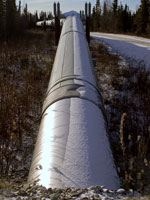
News |
- Senate Holds Hearings on Pesticides, Bee Population
- Prosperity Mine Tests Canadian Environmental And Aboriginal Commitment
- Judge: Keystone XL Not Allowed Through Nebraska
- Trans-Pacific Partnership: Poison for Healthy Economy
- Hudson Bay Polar Bear Park Announced
- Lord Stern: Be Fiercer On Climate Change
- Energy East Pipeline A Carbon Disaster Waiting To Happen
- Extreme Drought Measures in California
- Keeyask Hearings End with Some Surprise
- Species At Risk Act Lawsuit Forces Ministers To Act
- Canadian Government Science Cutbacks Alarming
- Canada's Emissions To Soar After 2020
| Senate Holds Hearings on Pesticides, Bee Population | 21 February 14 |

Neonicotinoid pesticides, used throughout Canada's agricultural industry, have been positively linked to declining health and numbers in bee populations, and have been subject to increasing scrutiny as evidence piles up. Corn and soybean crops are particularly linked to the use of neonicotinoids, with the pesticide spray accumulating on bees' bodies to degrade their immune systems. The damaging effects of these pesticides far outweigh the benefits, with up to 40% of Canada's food crops highly dependent on a thriving and efficient bee population. View February 5, 2014 Sierra Club Canada action alert pageView Senate Committees Directorate Notice of Meeting View Rabble.ca articles on Neonicotinoids View Proceedings of the Standing Senate Committee on Agriculture and Forestry Source:
Sierra Club Canada
|
|
 Print version Print version |
Top |
| Prosperity Mine Tests Canadian Environmental And Aboriginal Commitment | 21 February 14 |

"The Tsilhqot'in, supported by First Nations and non-First Nations across the country, fear the scathing findings of not one but two independent expert Panels will be forgotten amidst the lobbying efforts by Taseko Mines Ltd. and its supporters," said Chief Joe Alphonse, Tribal Chair for the Tsilhqot'in National Government. Approval of the New Prosperity mine would send a damning signal to Canada's First Nations and the world that the Canadian government isn't serious about consulting and accommodating First Nations on major resource projects. "First Nations across the province and the country are watching this decision very closely, as a test of the Harper government's commitment to First Nations or to maintaining the last shred of credibility left in the environmental assessment process," said Stewart Phillip of the Union of B.C. Indian Chiefs. View February 14, 2014 GlobalResearch articleView January 31, 2014 The Prince George Citizen article View January 29, 2014 Sun News article View January 17, 2014 The Vancouver Sun article View November 20, 2013 The Vancouver Sun article |
|
 Print version Print version |
Top |
| Judge: Keystone XL Not Allowed Through Nebraska | 21 February 14 |

Lancaster County District Judge Stephanie Stacy ruled Wednesday, February 19th, that the 2012 law improperly gave the governor authority to approve the pipeline route, said David Domina, an Omaha attorney who represented plaintiffs in the case. Nebraska's most vocal pipeline opponents — along with several close watchers of the Canada-U.S. relationship — say the inevitable outcome of the new legal entanglement will be long delays, perhaps as much as another year, before the issue is settled one way or another. "We don't see how the State Department possibly move forward when there is no certified route in Nebraska," said Jane Kleeb, director of Bold Nebraska, the state's largest anti-pipeline group. Lancaster County District Judge Stephanie Stacy said regulatory control over pipeline companies rests with the Nebraska Public Service Commission. She granted a permanent injunction to prevent Gov. Dave Heineman and the Nebraska Department of Environmental Quality from taking further action to advance the pipeline. View February 21, 2014 CBC News articleView February 21, 2014 Financial Post article View February 20, 2014 Toronto Star article View February 19, 2014 InsideClimate News article View February 19, 2014 JournalStar.com article View February 19, 2014 ClimateProgress article View February 24, 2014 InsideClimate News article |
|
 Print version Print version |
Top |
| Trans-Pacific Partnership: Poison for Healthy Economy | 21 February 14 |

Source: WikiLeaks
In January 2014, Wikileaks released a draft version of the 'Environment Chapter' from the Trans-Pacific Partnership (TPP), exposing most of the so-called "environmental protections" as toothless policies that serve to protect corporate profit not Mother Earth. When compared against other TPP chapters, the Environment Chapter is noteworthy for its absence of mandated clauses or meaningful enforcement measures. The dispute settlement mechanisms it creates are cooperative instead of binding; there are no required penalties and no proposed criminal sanctions. With the exception of fisheries, trade in 'environmental' goods and the inclusion of other multilateral agreements, the Chapter appears to be a public relations exercise. To date no debate in Canada's House of Commons, or Parliament Committees has occurred. View January 15, 2014 WikiLeaks press releaseView January 15, 2014 Common Dreams article View January 15, 2014 Common Dreams article View December 10, 2013 The Guardian article View June 26, 2013 Huffington Post article |
|
 Print version Print version |
Top |
| Hudson Bay Polar Bear Park Announced | 14 February 14 |
|
The Manitoba government is well into its planning steps for a huge new protected area around Hudson Bay. The park would surround Wapusk National Park, cross the Nelson River, and extend to the Ontario border. The potential size of the park is up to two million hectares, though it is unknown what portion of those lands would be protected. Manitoba Hydro installations, a future generation station, and new converter station are within the suggested boundaries. Also the Churchill Rail Line, which is being touted to carry Bakken fields and other new oil sands products to Churchill for shipment by sea, is within the suggested boundary. Several river fjords along the west wall of Hudson Bay above Churchill are candidate areas for protection from Manitoba's designers in Manitoba Conservation. These have also been signed off for protected status by Manitoba's minerals sector. Manitoba Wildlands is providing maps to help understand the potential lands and waters involved. "Public consultation, and meaningful steps with Aboriginal communities are required for decision making and designation of lands and waters. Protection standards in Manitoba are based on 20 years of regulatory language that is quite explicit. Zoning under the Parks Act can also occur, where lands are not protected. Manitoba Conservation will need to provide their scientific analysis, combined with traditional knowledge, as part of planning and consultation," commented Gaile Whelan Enns, director of Manitoba Wildlands.
View Proposed Hudson Bay Polar Bear Park maps |
|
 Print version Print version |
Top |
| Lord Stern: Be Fiercer On Climate Change | 14 February 14 |

This is all a big mistake, according to Lord Stern, who completed a review of the economics of climate change for Tony Blair in what now seems the different world of 2006. The record rainfall and storm surges that have brought flooding across the UK are a clear sign that we are already experiencing the impacts of climate change. There are powerful grounds for arguing that this is part of a trend. Stern says things have moved on in the eight years since his review. "I would have been much fiercer", he says. "Emissions have gone up faster than I thought and some of the effects of global warming are coming through more quickly, such as melting of the glaciers and the polar ice caps. But technical change has been faster too." Stern says that on present trends global temperatures will be 4-5C higher in the next century and governments are fooling themselves if they think this will only have a modest impact on their economies. "The last time we had a change in global temperatures of this order of magnitude it was in the other direction. It was called the Ice Age." View January 25, 2014 Reuters articleView January 24, 2014 Responding to Climate Change article View January 23, 2014 The Guardian article View January 22, 2014 The Weather Channel article View January 22, 2014 The Globe and Mail article View February 14, 2014 The Guardian article |
|
 Print version Print version |
Top |
| Energy East Pipeline A Carbon Disaster Waiting To Happen | 14 February 14 |

The Energy East pipeline, if built, would increase greenhouse gas emissions enough to wipe out all the gain from Ontario's elimination of coal-fired power plants, says a new report by the Pembina Institute. Author of the Pembina Institute report, Clare Demerse, said that conclusion demonstrates that regulators should consider the proposed pipeline's climate impacts in hearings on the project. "We think that we need to think about the implications of pipelines, not just in terms of the implications along the route, but there's also a climate conversation to be had," Demerse said. The report uses industry and government figures to argue that expansion of the industry is linked to expansion of the pipeline network that would bring its product to new markets. Climate Implications of the Proposed Energy East Pipeline provides a preliminary assessment of Energy East's impact on Canada's greenhouse gas emissions. It estimates the proposed pipeline's upstream impact as being between 30 and 32 million tonnes of annual emissions. View February 6, 2014 CBC News articleView February 6, 2014 Pembina Institute blog post View February 6, 2014 Pembina Institute report View February 6, 2014 Reuters article View January 27, 2014 Metro News article View October 25, 2013 The Guardian article |
|
 Print version Print version |
Top |
| Extreme Drought Measures in California | 14 February 14 |

Extreme times call for extreme action, and state officials are now implementing emergency plans such as bringing water in by truck to rural communities, drilling new wells to tap into the groundwater supply, and enforcing obligatory water conservation methods on residents and businesses. Widespread implications have arisen. These include the inability to grow crops or harbor livestock, a completely exhausted river system, salmon populations in danger of collapse, extreme risk of forest fires, diminishing health of state wildlife, and dangerously high levels of particulate matter, or smog, in the air around the Los Angeles basin. The Sierra Nevada mountains, whose snow pack normally feeds the river systems of California, has only 12% of its usual snow pack. View February 6, 2014 National Geographic articleView February 4, 2014 National Geographic article View February 1, 2014 The New York Times article View January 31, 2014 Aljazeera article View January 5, 2014 The New York Times article Source:
The New York Times
|
|
 Print version Print version |
Top |
| Keeyask Hearings End with Some Surprise | 10 January 14 |

Participants in the proceedings and hearings provided closing statements through the week. Most advised the CEC Panel that they could not recommend a licence for the generation station. Reasons varied, but included gaps in method, gaps in data, and the need for the public utility to update its standards, share information, and be open to advice. While the week progressed Manitoba Hydro decided to indicate that the Conawapa Generation Station project would be going to the Hydro board in March, and that the training program for Conawapa would upgrade those working on Keeyask also. The utility also indicated their plan on how to conduct the Regional Cumulative Effects Assessment (RCEA) for the hydro region in northern Manitoba was with the minister, and they expected to finish the work in 2014. The assessment was recommended by the CEC, and endorsed by Minister Makintosh with direction to the utility after Bipole III. Participants' response to this timeline for the RCEA was consistent: The RCEA needs to be independent from the utility, with its cooperation, so as to avoid self assessment, and the same experts used for most Hydro projects. To the surprise of the CEC and participants, Manitoba Hydro also indicated the general contract to build Keeyask has been awarded. The CEC report regarding the Keeyask Generation Project has to be in the hands of the Minister within 120 days of the end of hearings. View January 8, 2014 Manitoba Wildlands closing statementsView Manitoba Wildlands Keeyask Generation Project page |
|
 Print version Print version |
Top |
| Species At Risk Act Lawsuit Forces Ministers To Act | 10 January 14 |

"The federal government's chronic delays in producing recovery strategies for Canada's endangered wildlife are forcing species already struggling to survive to wait even longer for the protection they desperately need," said Devon Page, Ecojustice executive director. "Worse, not having these recovery strategies in place makes it impossible for regulators to consider the full environmental impact of major projects like the Northern Gateway pipeline." The lawsuit challenges the federal government's multi-year delays in producing recovery strategies for four species — the Pacific Humpback Whale, Nechako White Sturgeon, Marbled Murrelet and Southern Mountain Caribou. The habitat for all four species would be impacted by the construction and operation of the Northern Gateway pipeline, among other proposed developments. Ecojustice lawyers are acting on behalf of five environmental groups in this lawsuit: David Suzuki Foundation, Greenpeace Canada, Sierra Club BC, Wilderness Committee and Wildsight. View January 9, 2014 Huffington Post articleView January 8, 2014 Global News article View January 2014 David Suzuki Foundation article View November 7, 2012 Sierra Club B.C. information page View July 13, 2006 Sierra Club Canada media release |
|
 Print version Print version |
Top |
| Canadian Government Science Cutbacks Alarming | 10 January 14 |

"What's important is the scale of the assault on knowledge, and on our ability to know about ourselves and to advance our understanding of our world," said James Turk, executive director of the Canadian Association of University Teachers. In the past five years the federal government has dismissed more than 2,000 scientists, and numerous of programs and world-renowned research facilities have lost their funding. Programs that monitored things such as smoke stack emissions, food inspections, oil spills, water quality, and climate change have been drastically cut or shut down altogether. Scientists went public with concerns that irreplaceable science could be lost when Department of Fisheries and Oceans (DFO) libraries are closed.DFO plans to shut down seven of its 11 libraries by 2015. Already, stories have emerged about books and reports thrown into dumpsters and the general public being allowed to rummage through bookshelves. "It makes no sense, financially or otherwise to close down libraries that hold millions if not hundreds of millions of dollars of research from studies over such a long period of time." said Kelly Whelan-Enns, researcher and policy analyst at Manitoba Wildlands. "What you have in effect is a muzzling of science and a profound restriction of anyone's ability to access the information. Information that supports action contrary to further development of the toxic bitumen tar sands projects may be most at risk." View January 10, 2014 CBC News articleView January 8, 2014 The Tyee article View January 7, 2014 The Globe and Mail article View January 6, 2014 CBC News article View April 14, 2013 Canada.com article |
|
 Print version Print version |
Top |
| Canada's Emissions To Soar After 2020 | 10 January 14 |

The reports were submitted to the UN Framework Convention on Climate Change in late December with no announcement or press release. At the same time the reports were being filed, Prime Minister Stephen Harper indicated his government was delaying for two years long-promised regulations to reduce emissions from booming oil-sands projects. In contrast, U.S. President Barack Obama laid out a plan last summer, including regulations on new and existing coal-fired power plants, that would largely meet the U.S. 2020 commitment, which is the same as Canada's. Canada's emissions between 2020 and 2030 are predicted to climb by 81 million tonnes, taking Canada 11 per cent above 2005 levels – notwithstanding a new round of international climate negotiations aimed to find further global reductions from the 2005 base year. View January 10, 2014 Pembina Institute blog postView January 10, 2014 Toronto Star article View January 8, 2014 The Globe and Mail article View December 19, 2013 article View October 2013 Environment Canada report View Environment Canada Canada's Greenhouse Gas Emissions Projections page |
|
 Print version Print version |
Top |


 RSS Feeds:
RSS Feeds:
